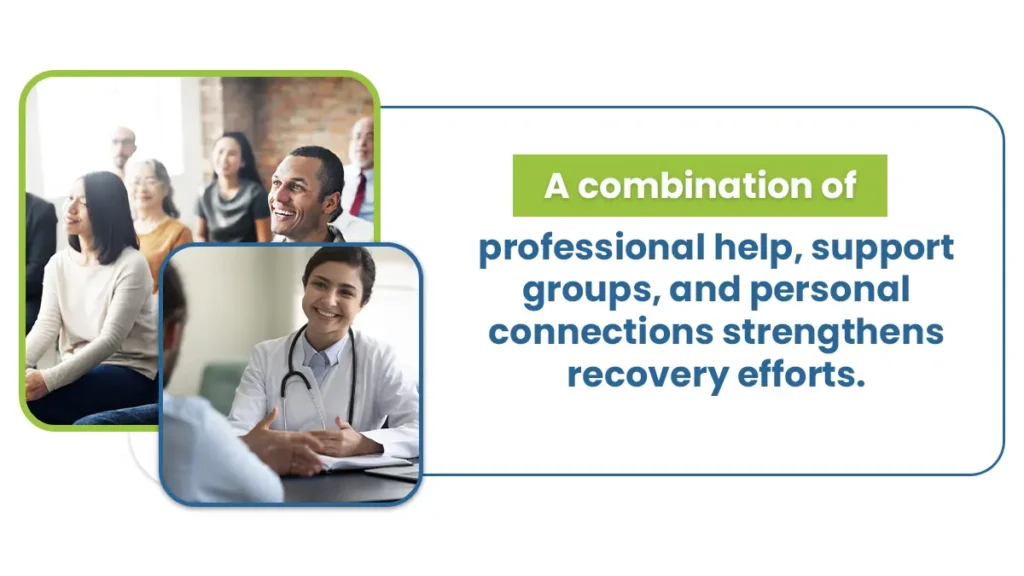Many families deal with alcohol abuse and its impact on their loved ones. Supporting someone with alcohol use disorders requires understanding and patience. Encouraging them to join support groups can make a significant difference.
Family members and others can be crucial in aiding and motivating them to seek help for alcoholism. Let’s explore practical ways to help your loved one overcome their drinking problem and build a healthier, alcohol-free life.
Key Takeaways
Patience and understanding are crucial when helping someone facing alcohol abuse. Here’s what you need to know to help a loved one with addiction:
- Identifying signs of abuse is vital for addressing alcohol problems and ensuring well-being.
- Approach conversations about drinking with empathy, choosing words carefully to express genuine concern.
- Support recovery, break enabling patterns, and encourage positive change in an individual’s life.
- A combination of professional help, support groups, and personal connections strengthens recovery efforts.
The Haven Detox-South Florida is here to support you with its holistic treatment services. Call us at (561) 328-8627 today.
Identifying Alcohol-Related Health Issues
Alcohol abuse can manifest through visible symptoms, behavior changes, and psychological indicators. Keep an eye out for signs like heavy drinking, withdrawal symptoms, and altered behavior in daily life. Recognizing these indicators is the first step in addressing alcohol problems and safeguarding physical and mental health.
Visible Symptoms
Alcohol misuse may exhibit visible symptoms, impacting physical health and daily life. Recognize signs such as trouble at home, consequences in family life, and strong craving for alcohol consumption affecting personal and social well-being.
Behavior Changes
Be attentive to behavior changes that signal alcohol dependence. These experiences might include alterations in daily routines, neglect of one’s own needs, and strained relationships with a spouse or family members due to alcohol-related issues.
Psychological Indicators
Look for psychological indicators since there is a link between addiction and depression. Be aware of how alcohol problems may intertwine with mental problems, contributing to medical conditions like dual diagnosis and further impacting psychological well-being. Identifying these signs is crucial for taking the first step toward recovery.
Addressing Drinking Issues with Compassion
If you’re concerned about a loved one’s drinking, approaching them with care is essential. Here’s a guide on deciding the right time and place, choosing appropriate words, and avoiding aggressive behavior.
Deciding the Right Time and Place
Timing is crucial when addressing someone about their drinking. Pick a time when they are calm and sober, ensuring minimal distractions. A quiet, private space fosters open communication and makes them feel more at ease.
Choosing Appropriate Words
Use gentle and non-judgmental language to express your concerns. Share your observations and feelings without placing blame. Instead of saying, “You have a drinking problem,” try saying, “I’ve noticed changes, and I’m worried about you.” Be specific about behaviors you’ve observed, fostering understanding.
Avoiding Confrontational Behavior
Approach the conversation with empathy, steering clear of aggressive tones. Be a supportive listener, acknowledging their feelings and experiences.
Encourage them to share their perspective and avoid issuing ultimatums. Instead of making demands, express your desire to help and support them through challenges.
Initiating a conversation about someone’s drinking can be delicate. By choosing the right time and place, using appropriate words, and avoiding bold behavior, you create a supportive environment for addressing the issue and helping your loved one take the first steps toward positive change.
Encouraging Them to Seek Help for a Healthier Tomorrow

When supporting someone to stop drinking, it’s crucial to cease enabling behaviors that contribute to their alcohol misuse. Recognizing and breaking these patterns can pave the way for positive change.
Share Facts about Alcohol Abuse
Start by sharing factual information about the impact of alcohol abuse. Discuss the potential consequences on physical and mental health, relationships, and overall well-being. Providing concrete information can help the individual understand the gravity of their situation.
Explain Personal Feelings and Concerns
Express your feelings and concerns honestly. Use “I” statements to convey how their drinking affects you personally. For example, say, “I feel worried when I see you struggle with alcohol because I care about your well-being.” This approach avoids sounding accusatory and emphasizes your genuine concern.
Offer Support and Encouragement
Emphasize your willingness to support them in making positive changes. Encourage seeking professional help, such as talking to school counselors or accessing substance use programs. Professional support may include medication-assisted treatment, counseling, or therapy.
Stopping Enabling Behavior
Examine your actions to identify enabling behaviors, such as covering up for them or minimizing the consequences of their drinking. Cease these actions to allow them to face the full impact of their choices, fostering a greater motivation to change.
Remember, there are different ways to approach the conversation, and each person may respond differently.
Essential Techniques for Alcohol Recovery Support
Supporting a friend who struggles with alcohol can be challenging but essential for their well-being. Here are easy-to-follow techniques to aid in their recovery journey.
Encourage Participation in Support Groups
Suggest joining support groups like Al-Anon or Alcoholics Anonymous meetings, where individuals facing similar challenges share experiences and advice. Being part of a community can provide a sense of understanding and encouragement.
Help Them Find a Suitable Alcohol Treatment Program
Explore treatment options together, emphasizing the importance of seeking professional help. Discuss different types of addiction treatment, such as counseling, therapy, or even prescription drugs, if recommended by health care providers. Understanding these options helps tailor a recovery plan that suits their needs.
Promote Healthier Living Habits
Advocate for healthier living by discussing the impact of alcohol on their physical and mental health. Encourage them to set limits on alcohol intake and explore alternative coping mechanisms for dealing with emotional problems.
Stress the positive effects of adopting a healthier lifestyle. Supporting someone through alcohol recovery may involve facing symptoms of alcohol withdrawal.
During difficult times, it’s crucial to offer outside help, especially if their drinking habits pose a risk to their health. Be a reliable source of assistance, emphasizing that seeking intervention is not an ultimatum but a pathway to long-term recovery.
Resolving Conflicts and Challenges
Navigating conflicts and challenges when supporting someone through alcohol recovery requires patience and strategic approaches. Here’s a guide with subheadings for handling potential difficulties.
Recognizing Signs of Conflict
Be vigilant for signs of conflict, such as resistance to treatment, denial of the severity of the issue, or strained relationships. Identifying these signs allows for proactive intervention.
Open Communication
Maintain open communication with the individual. Motivate them to express their feelings and concerns. Foster an environment where they feel safe discussing challenges, promoting transparency.
Understanding Resistance
Recognize that resistance to change is expected. Address this by acknowledging your loved one’s feelings without judgment, helping them explore the root causes of resistance, and highlighting recovery benefits.
Tips to Support Long-Term Sobriety
Supporting long-term sobriety involves consistent efforts and understanding. Here are easy-to-follow tips to help someone on their journey:
Encourage Healthy Habits
Promote a lifestyle that prioritizes physical and mental well-being. Encourage regular exercise, a balanced diet, and sufficient sleep to support overall health and resilience.
Celebrate Milestones
Acknowledge and celebrate milestones, whether big or small. Recognizing achievements fosters a sense of accomplishment and motivation to maintain sobriety.
Stay Connected with Support Networks
Emphasize the importance of staying connected to support groups, friends, and family. Regular communication with those who understand the journey provides encouragement and accountability.
Cultivate Coping Strategies
Help develop healthy coping mechanisms for managing stress and negative emotions. Encourage mindfulness, meditation, or other activities that promote emotional well-being.
Plan for the Future
Assist in setting future goals and plans. A clear vision and purpose can provide motivation and direction for a fulfilling, sober life.
By incorporating these tips into daily life, individuals can build a foundation for long-term sobriety. The journey is ongoing, and consistent support, understanding, and encouragement contribute significantly to a successful recovery.
Get Help
If you’re suffering from alcoholism, getting help as early as possible is essential. Alcoholism is a severe illness that can lead to many problems. Getting help as early as possible can significantly improve your chances of recovery. Call us to get started with treatment.
Our resources are available to help you overcome your drinking habits, including Alcoholics Anonymous, among other evidence-based therapies and innovative treatments proven by medical science to effectively manage AUD (alcohol use disorder). Our admissions counselors can help you learn more about the disease and how to keep it out of your life. Contact us confidentially today.
Start a Sober Life with The Haven Detox-South Florida
Embark on a transformative journey with The Haven Detox-South Florida.Our expert team specializes in alcoholism addiction treatment, offering personalized strategies for recovery. Begin the healing process with our comprehensive detox service, providing a safe and supportive environment. Transition seamlessly into our residential rehab, where compassionate care meets evidence-based therapies.
Let us guide you towards lasting sobriety. Call us for more information at (561) 328-8627 today.
Frequently Asked Questions
What to do when your friend has too much to drink?
If a friend has had too much to drink, prioritize their safety. Stay with them, offer water, and discourage more alcohol. If they’re severely intoxicated, seek medical help. Never leave them alone, and ensure they don’t drive. Support their well-being, and consider discussing responsible drinking habits when they’re sober.
How can you approach a loved one about their drinking problem?
Approaching a loved one about their drinking problem requires sensitivity. Choose a calm, private setting and use non-confrontational language. Express your concerns using “I” statements, emphasizing your feelings. Offer support, listen actively, and encourage seeking professional help. Focus on their well-being and a collaborative path to recovery.
Is there any way to persuade an alcoholic to stop drinking?
Persuasion alone may not be effective, but supportive encouragement can make a difference. Express your concerns, provide information on the impact of alcohol abuse, and emphasize your support for their well-being. Encourage professional help and treatment options. Understand that change is a personal choice, and expressing care and understanding can be powerful motivators for seeking recovery.

